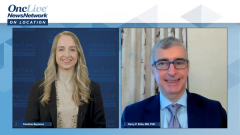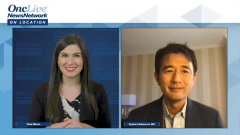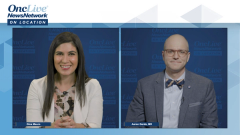
Unpacking Data in Multiple Myeloma, Non-Hodgkin Lymphoma, and GVHD: Drs Noopur Raje, Joshua Brody, and Ryotaro Nakamura
In this episode, OncLive® speaks with Dr. Noopur Raje on developments in multiple myeloma, Dr. Ryotaro Nakamura on data related to graft-vs-host disease, and Dr. Joshua Brody on the latest in non-Hodgkin lymphoma.
Today-
We are reporting from the 2022 ASH Annual Meeting!
Get ready, because we are presenting the top news presented each day during the meeting—and soon we’ll speak with Dr. Ryotaro Nakamura on data related to graft-vs-host disease, and Dr. Joshua Brody on the latest in non-Hodgkin lymphoma.
Welcome to OncLive News Network! I’m Gina Mauro.
In the phase 3 TRANSFORM trial, treatment with lisocabtagene maraleucel led to a statistically significant and clinically meaningful improvements in event-free survival, complete response rate, and progression-free survival in the second-line setting for patients with relapsed/refractory large B-cell lymphoma.
Mosunetuzumab continued to elicit durable responses in patients with relapsed/refractory follicular lymphoma, and showed higher response rates, duration of response, progression-free survival, and time to next therapy compared with patients’ last prior therapy. The encouraging data were from an updated analysis of a phase 2 trial.
In younger patients with mantle cell lymphoma, adding ibrutinib during induction and as maintenance therapy with or without autologous stem cell transplant showed strong efficacy signals and an acceptable safety profile in the randomized TRIANGLE trial. While more follow-up is needed to clarify the role of transplant with ibrutinib-containing regimens, the current data already support the use of frontline ibrutinib in this patient population.
A new CD19-directed CAR-T cell therapy, called rapcabtagene autoleucel, demonstrated distinct cellular kinetics, efficacy, and a manageable safety profile. In patients with relapsed/refractory diffuse large B-cell lymphoma in updated findings of a phase 1 study.
Finally, in multiple myeloma, mezigdomide, a novel cereblon E3 ligase modulator, showed promising efficacy in combination with dexamethasone in patients with triple-class refractory disease. The objective response rate was nearly 40%, and was 50% in those who received anti-BCMA therapy.
Please be sure to check out more of our coverage from the 2022 ASH Annual Meeting at OncLive.com.
That’s all for today. Tomorrow, we will sit down virtually with Dr. Catherine Coombs for updates in chronic lymphocytic leukemia, Dr. Nelli Bejanyan on the latest in graft-vs-host disease, and Dr. Aaron Gerds on new data in myeloproliferative neoplasms.
Thank you for watching OncLive News Network: On Location, I’m Gina Mauro.







































